ACNM Strategic Plan and DEIB
The ACNM 2021 – 2024 Strategic Plan names Diversity, Equity, & Inclusion as our top priority and the foundation for all our other strategic efforts. Our goal is to promote equity, diversity and inclusion throughout the profession and across ACNM with integrity to ensure more equitable and inclusive opportunities. We will accomplish this by creating and modeling an equitable, diverse and inclusive ACNM culture, training and promoting diversity and equity, internally and externally, applying an equity lens to policies, programs, and documents, and committing to participate in anti-racism and equity activities with members, partners, and sponsors.Background
ACNM formed a Diversity & Inclusion Task Force in 2012 to provide an understanding of the strengths and barriers in our organization related to diversification and inclusion and to begin to develop a strategy to become a more diverse and inclusive organization. In 2013, the Task Force selected Jodi DeLibertis of Greater Good Consulting to assist in developing this strategy. The work of the Task Force and the consultancy included personal interviews, focus groups, and a survey of ACNM members, as well as observations about how ACNM functions as an organization. The Task Force has also provided a number of programs, activities and communications for ACNM members at the ACNM Annual Meeting, Midwifery Works, and Quickening.In 2020, ACNM formed the Racism in Midwifery Education Task Force. This Task Force was divided into subgroups designed to focus on elements of midwifery education. The Program Content Subgroup (PCS) was tasked to explore how racism is manifested in and rooted within midwifery education program content and to recommend ways to eradicate it and build antiracist curricula.
In the spring of 2021, ACNM embarked on a journey to engage a diversity, equity and inclusion expert to partner with key volunteer stakeholders to create a multi-year strategic plan, reach a consensus on collective goals, develop initiatives around the goals, and determine how to measure success. The project included looking back at previous reports prepared by consultants engaged by ACNM and taking into account other work that had been done to date. ACNM formed the DEI Strategy Team, which included members of the Board, DEIB Committee, and ACNM staff who together formed the goals of ACNM and prioritized the initiatives that we should put in place to advance those goals. The final Diversity, Equity, & Inclusion Strategy was presented to the Board and approved during its December Board meeting.
2022
- ACNM held the Diversity & Inclusion Conference in August 2022, bringing together experts and maternal healthcare providers to strengthen understanding of DEIB and learn how to reduce health disparities by building culturally congruent teams to provide care for diverse patient populations. Creating an environment that embraces and promotes inclusivity by leveraging the latest DEIB trends and ideas, the conference content provides an amazing educational experience for all those involved in patient care, education and research: midwives, advanced practice nurses, physician assistants, medical assistants, nurses, health educators, administrative staff, and support staff. Interested in getting access to education sessions? You can get On-Demand access now.
- The Addressing Racism and Advancing Equity in Midwifery Education: A Program Content Toolkit for Action was created by the Program Content Subgroup of the Racism in Midwifery Education Task Force. The purpose of the Toolkit is to provide faculty with resources for addressing the historical racism in American midwifery and preparing faculty and future midwives to be aware of racism and bias in themselves, in institutions, and in the health care system. Click below to download the PDF.
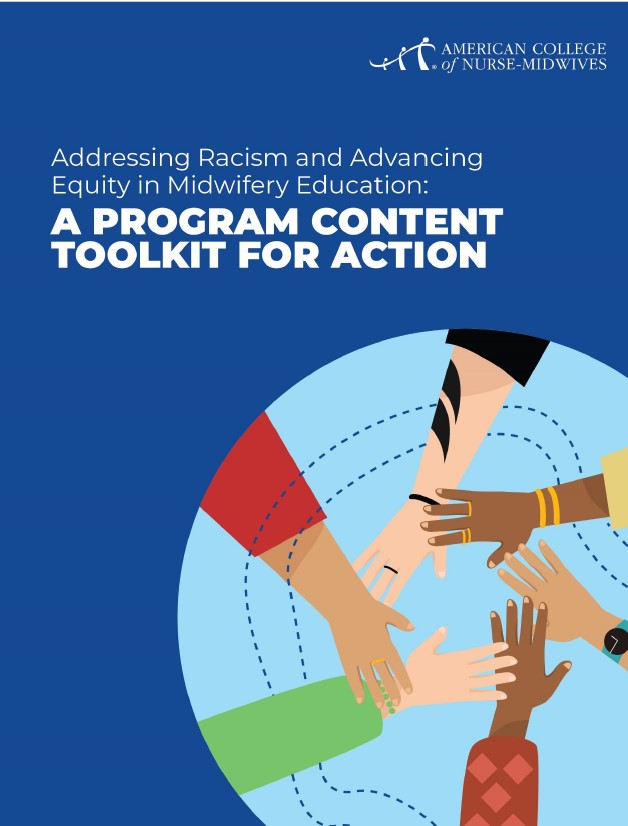
- The ACNM Midwives of Color Committee (MOCC) in consultation with SHIFT Consulting, created Unpacking our Birth Bag: Anti-Racism Toolkit for Midwives. The "Birth Bag" is part of midwives’ identity and a history inseparable from racism. This toolkit should be used to unpack racism and privilege from your “birth bag” in hopes of restoring culturally competent care and making the midwifery profession more inclusive to all. Click here or the image below to download.
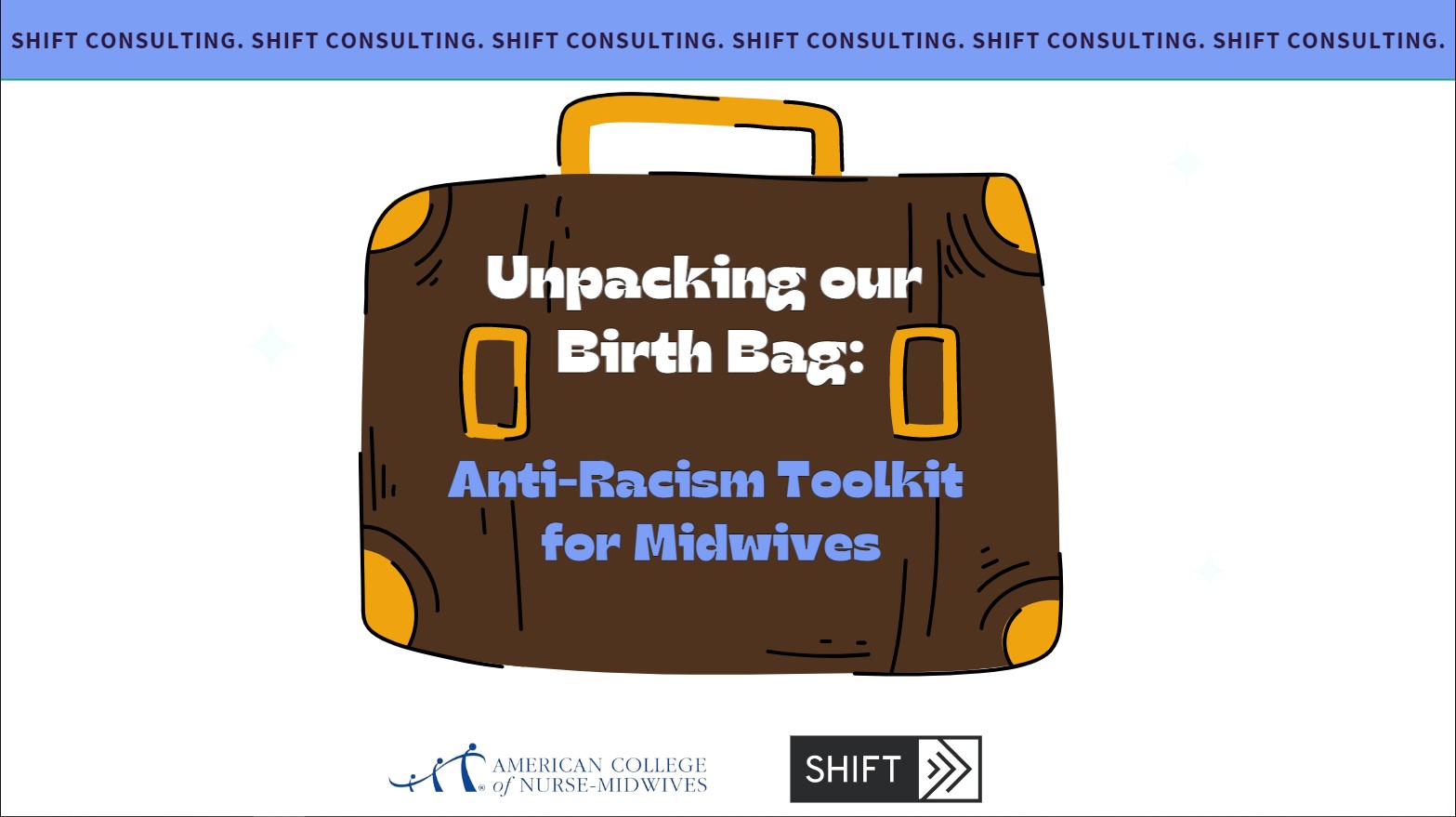
2021
- Published "Honoring Black Grand Midwives and Supporting Black Midwives Today" article
- Hosted three free webinars during Black History Month:
- In March, the ACNM Board released an apology letter and Truth and Reconciliation Resolution, acknowledging harms caused by its perpetuation of systemic racism and establishing a set of resolutions in response.
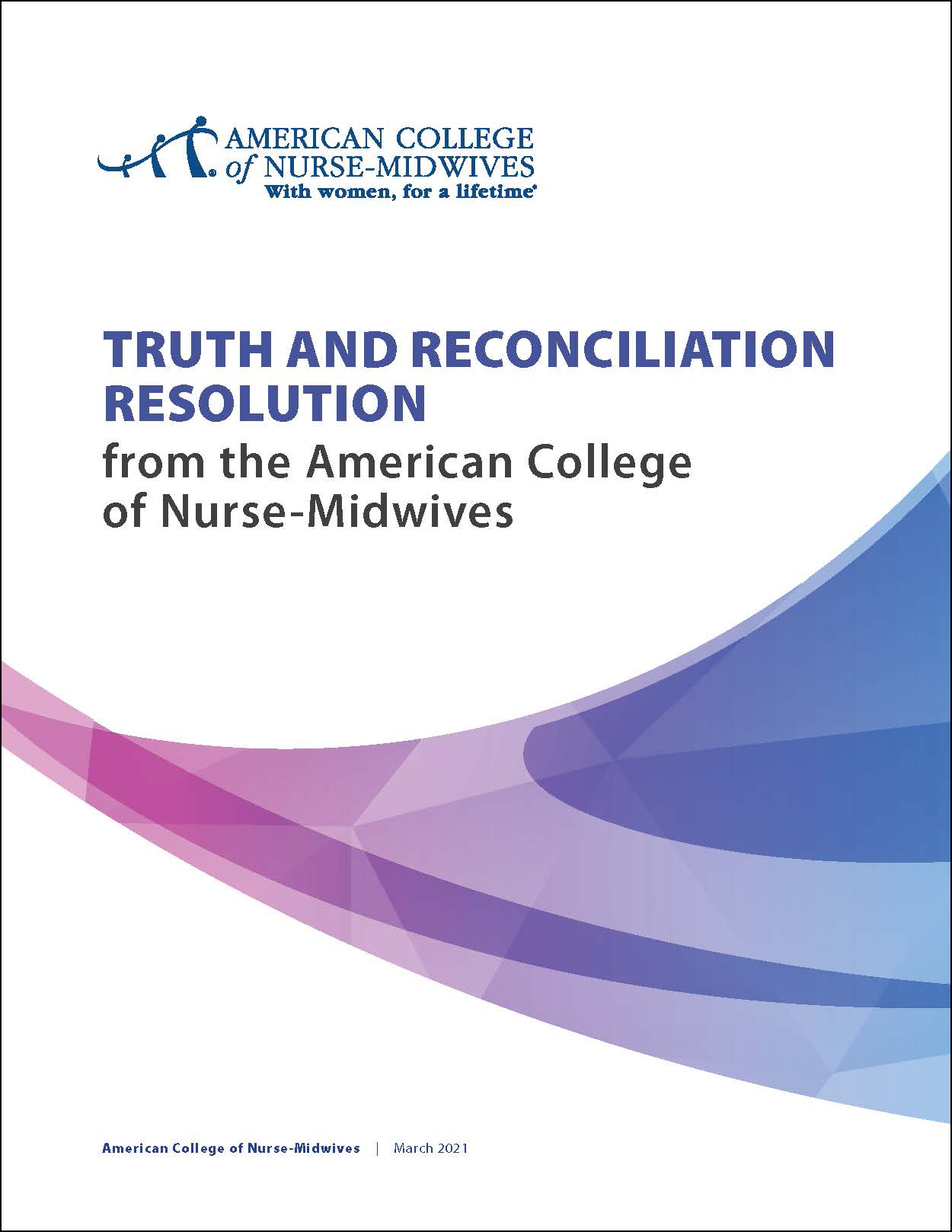
- ACNM's Diversity, Equity, and Inclusion Strategy was presented to the Board and approved during its December Board meeting. Click below to download.
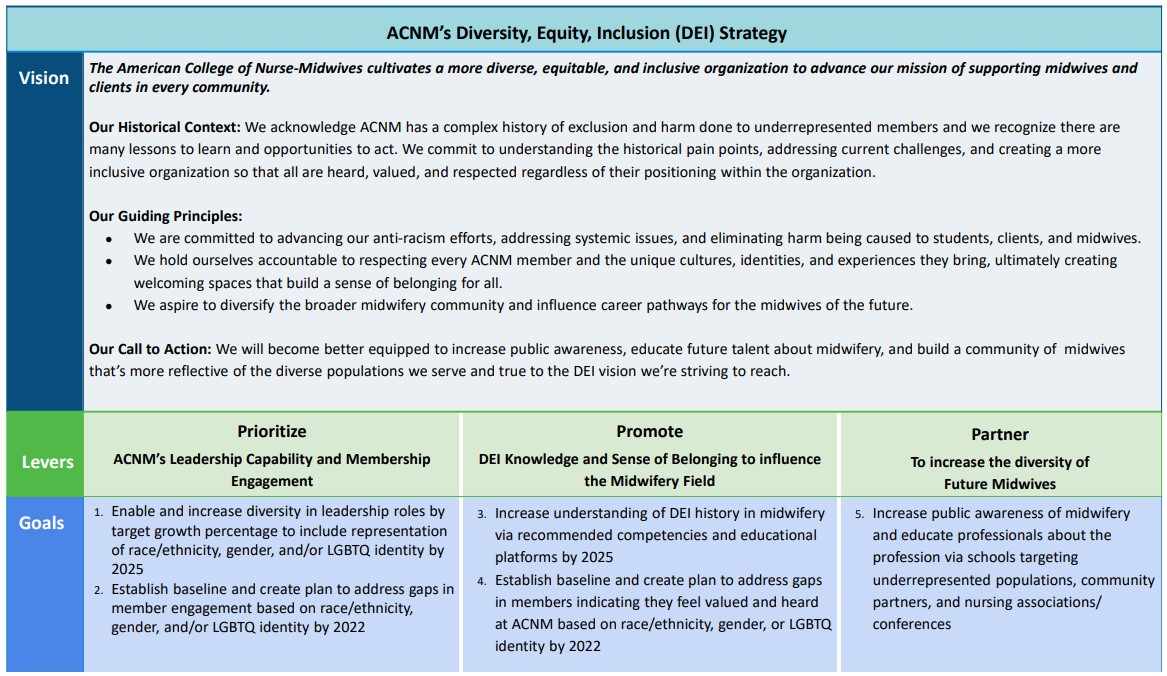
2020
- Hosted the following anti-racism webinars (linked titles have recordings in our Online Learning Center):
- What Is Race & Why Does It Matter to Me?
- Anti-Racist Strategies for White Midwives: Tools for Self-Examination & Action
- The Power of Language: Thinking More Critically About the Words We Use
- Griot Session: BIPOC Midwife Faculty and Service Directors Share Their Stories
- Know Black Midwifery History in America: It Matters!
- Resilience, Resistance, and Recourse: Advancing as a BIPOC Student in a Racist Structure
- Resilience, Resistance, and Recourse: Thriving Through Systemic Racism
- Hosted the virtual 2020 Inclusion Conference: Dare to Think Different in September. View the program.
- Hosted a Listening Townhall Session on September 22nd for members to bring thoughts, ideas, and/or concerns regarding the organization's efforts over the last few months.
- Signed on to letter demanding Congressional leaders take action in support of Black Reproductive Justice leaders and the Movement for Black Lives. Read the letter here.
- Formed the Racism in Midwifery Education Task Force and began regular meetings.
- The Journal of Midwifery & Women's Health released its Racism, Antiracism, and Racial Equity article library.
- Developed ACNM's Anti-Racism Roadmap for Change, highlighting the actions we have taken, are taking, and plan to take to address systemic racism. This roadmap highlights the actions we have taken, are taking, and plan to take. The roadmap is updated as tasks are completed. (Click here to download as a PDF)
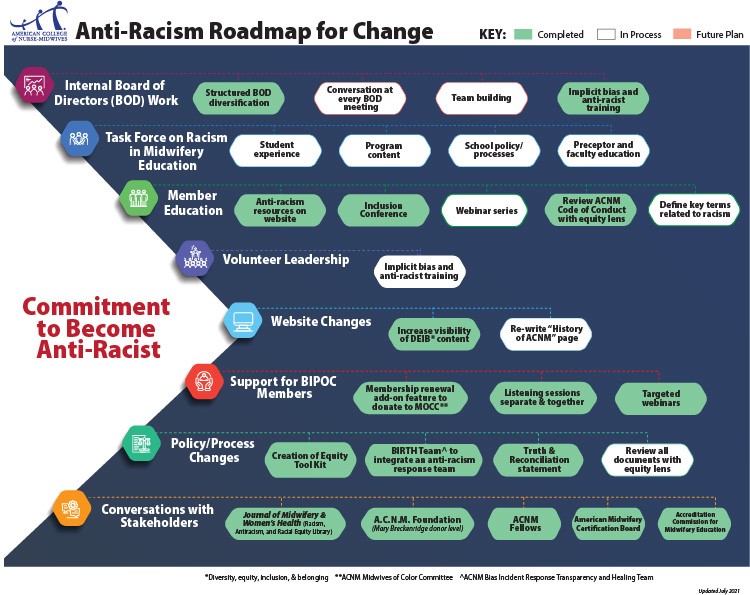
Anti-Racism Webinar Series
View upcoming and past webinars on our Meetings & Events page.Volunteer Commitment
Prejudicial and discriminatory practices and policies remain deeply entrenched in our nation. These structural forces perpetuate racism and race-based disparities in midwifery and contribute to inequities in reproductive health and negative health outcomes for Black, Brown, Indigenous, and people of color. ACNM stands accountable for the pain that has occurred as a result of racism in our history, our midwifery programs, and our organization. ACNM is committed to the work of dismantling structural racism by recognizing and addressing historical and current racism within midwifery education, clinical practice, and institutions including ACNM.
We call on our organization, midwifery programs, and members to prioritize supporting our friends, families, students, colleagues, communities, each other, and most especially, those who do not have the privilege of looking away from the fear, the trauma, and the grief. We are all created equal. We must all hold ourselves accountable and fervently defend the basic human right of all people to be treated with dignity, decency, and respect in environments and through interactions characterized by mutual trust, fairness, and the absence of intimidation, oppression, and exploitation.
We call on our organization, midwifery programs, and members to prioritize supporting our friends, families, students, colleagues, communities, each other, and most especially, those who do not have the privilege of looking away from the fear, the trauma, and the grief. We are all created equal. We must all hold ourselves accountable and fervently defend the basic human right of all people to be treated with dignity, decency, and respect in environments and through interactions characterized by mutual trust, fairness, and the absence of intimidation, oppression, and exploitation.
The ACNM Board charged three respective committees, the Ethics Committee, Midwives of Color Committee (MOCC), and Diversity, Equity, Inclusion and Belonging Committee (DEIB), with jointly developing a resolution of truth and reconciliation regarding ACNM's history of racism. This critically mindful work will require time and consensus to address our history and outline guiding principles for the way forward.
As this work progresses, ACNM will continue to recognize our desire and commitment to do better than our past. We will begin to step into our truth; a truth that has caused pain as a result of racism in our history, in our midwifery programs, and in our organization. A truth that created a hierarchical system which continues to perpetuate harm and marginalization. A truth that has hindered us from acknowledging our racist past and from caring for all our members equally and equitably. A truth that has delayed the urgent need to address the issues and experiences that students of color are having in midwifery education programs.
The road to reconciliation and recovery is not an easy one, but it is imperative if we are to care for our communities, the people we serve, and our profession. It is imperative if we are to live up to the standards of midwifery care, a commitment to providing the highest levels of compassionate care to another human soul. We will face challenges related to implementing changes that must be made if we are to truly become an antiracist, open organization that welcomes all midwives. There will be pushback from some members that don’t understand or are not willing to understand concepts such as white privilege, microaggression, systemic racism, discrimination, and bias. We may stumble in our attempts to find the right path, but we will get back up and carry on.
If you have never cared to understand why anti-racism work is everyone’s responsibility, we urge you to understand now. It is only through each of us doing the work of learning what has brought us to this place and what we need to do to move forward, that the process of healing past and current harms can begin. Only then can we as an organization realize harmony in order to center our shared goals to deliver optimal, accessible, and equitable midwifery care to women, individuals, and families. Reconciliation must be an inclusive and equitable commitment. We are all created equal. We must all hold ourselves accountable and fervently defend these basic human rights, and ACNM commits to doing so as an organization.
As this work progresses, ACNM will continue to recognize our desire and commitment to do better than our past. We will begin to step into our truth; a truth that has caused pain as a result of racism in our history, in our midwifery programs, and in our organization. A truth that created a hierarchical system which continues to perpetuate harm and marginalization. A truth that has hindered us from acknowledging our racist past and from caring for all our members equally and equitably. A truth that has delayed the urgent need to address the issues and experiences that students of color are having in midwifery education programs.
The road to reconciliation and recovery is not an easy one, but it is imperative if we are to care for our communities, the people we serve, and our profession. It is imperative if we are to live up to the standards of midwifery care, a commitment to providing the highest levels of compassionate care to another human soul. We will face challenges related to implementing changes that must be made if we are to truly become an antiracist, open organization that welcomes all midwives. There will be pushback from some members that don’t understand or are not willing to understand concepts such as white privilege, microaggression, systemic racism, discrimination, and bias. We may stumble in our attempts to find the right path, but we will get back up and carry on.
If you have never cared to understand why anti-racism work is everyone’s responsibility, we urge you to understand now. It is only through each of us doing the work of learning what has brought us to this place and what we need to do to move forward, that the process of healing past and current harms can begin. Only then can we as an organization realize harmony in order to center our shared goals to deliver optimal, accessible, and equitable midwifery care to women, individuals, and families. Reconciliation must be an inclusive and equitable commitment. We are all created equal. We must all hold ourselves accountable and fervently defend these basic human rights, and ACNM commits to doing so as an organization.
- Complete a Truth and Reconciliation Statement. The Ethics Committee is leading this effort with representatives from the Midwives of Color Committee (MOCC) and the Diversity, Equity, Inclusion and Belonging Committee (DEIB) to develop a resolution of truth and reconciliation regarding ACNM’s history of racism and resolve for a future of diversity, equity, and inclusion.
- Host a Listening Session every two months to check in with members and gather feedback on our progress regarding anti-racism work and anything else members want to discuss.
- Establish a Racism in Midwifery Education Task Force to develop strategies to facilitate a more diverse midwifery student population, improve the student experience for students of color, and support the overall need to diversify the midwifery workforce to better reflect the demographics of our country and our patient population.
- Implement an Equity and Racism Lens Tool for use when reviewing policies, documents, publications, programs, and decisions within ACNM.
- Host an anti-racism webinar series, beginning with “What is Race and Why Does It Matter to Me?” for ACNM members.
- Engage the ACNM Board in anti-racism self-development work.
- Increase visibility of our diversity & inclusion work on our website, via our Diversification and Inclusion webpage.
- Ensure mutual understanding among our members by defining key terms such as systemic racism, oppression, white privilege, and microaggression.
- Host an Inclusion Conference, that addresses member recommendations from ACNM’s 2019 Listening Survey Project, in collaboration with D&I experts and input from ACNM Committees such as the MOCC, DEIB Committee, and Black, Indigenous, and people of color (BIPOC).
- Develop a resource list for Board members and membership to educate members in developing anti-racist actions.
The world witnessed the brutal murder of George Floyd on May 25, 2020 and the expressions of pain that followed. Immediate Past President Susan Stone addressed attendees of the ACNM Virtual Annual Meeting, acknowledging the harsh realities of racism experienced by Black, Brown, and Indigenous people in our country.
ACNM released a letter from our new President, Cathy Collins-Fulea, including an ACNM statement, Black Lives Matter: Put an End to State-Sponsored and Police Violence.
Members have asked for a list of what ACNM has done and what we will do going forward. Here are some ACNM initiatives over the past year aimed at expanding our understanding of systemic racism within the College and our profession, of acknowledging the wrongs of the past and eliminating racism within midwifery education, clinical practice and the College itself.
ACNM released a letter from our new President, Cathy Collins-Fulea, including an ACNM statement, Black Lives Matter: Put an End to State-Sponsored and Police Violence.
Members have asked for a list of what ACNM has done and what we will do going forward. Here are some ACNM initiatives over the past year aimed at expanding our understanding of systemic racism within the College and our profession, of acknowledging the wrongs of the past and eliminating racism within midwifery education, clinical practice and the College itself.
- Permanently changed the composition of the Board to ensure at a minimum the inclusion of two midwives of color, to ensure BIPOC inclusion in positions of leadership in the College.
- Formed the Black Midwives Caucus for Reproductive Justice & Birth Equity.
- Developed and disseminated a Diversity Toolkit and resources for members.
- Developed and shared with educational program directors a book list about the diverse history of midwifery so it could be included in curriculum for students.
- Partnered with Black Mamas Matter Alliance and ICM during 2020 Black History Month for a statement on Eliminating the Racial Disparities Contributing to the Rise in US Maternal Mortality.
- Supported legislation aimed at growing and diversifying the maternity care work force, working with the House Black Maternal Health Caucus.
- Continued use of our Bias Incident Response, Transparency & Healing (BIRTH) Team, an on-call D&I volunteer team offering rapid response to bias incidents in real time during ACNM Annual Meetings.
- The Diversity & Inclusion Committee changed its name to Diversity, Equity, Inclusion & Belonging (DEIB) Committee.
- Sponsored the Black Mamas Matter Alliance's Black Maternal Health Week, April 11-17, centering Black mamas and amplifying the conversation around Black maternal health.
- Hosted a Town Hall webinar on April 20 on “COVID-19 Through the Lens of Equity” with 275 attendees.
- Hosted a Listening Session: Next Steps on Addressing Racism webinar on June 11 to capture ideas and suggestions for how to move forward with addressing racism in our profession and organization.
- Hosted a follow-up to the listening session, Action Session: Addressing Systemic Racism on June 25, for BIPOC members only.
Eliminating the Racial Disparities Contributing to the Rise in U.S. Maternal Mortality: Perspectives from the American College of Nurse-Midwives (ACNM), Black Mamas Matter Alliance (BMMA), and International Confederation of Midwives (ICM)
As the American College of Nurse-Midwives (ACNM) recognizes the Year of the Nurse and the Midwife, our nation participates in a month-long commemoration of black history. ACNM acknowledges an essential part of our American story, one that offers positive transformation and change through greater understanding. Black History Month reminds us of where we have been as a nation, so we know where we need to go. Today, our country needs to end preventable maternal mortality, a tragedy often fueled by racism and systemic inequality that disproportionately impacts people of color. To broaden the discussion, ACNM invited its state affiliate organizations, the Black Mamas Matter Alliance (BMMA), and the International Confederation of Midwives (ICM) to provide commentary on the issue.
Read more
As the American College of Nurse-Midwives (ACNM) recognizes the Year of the Nurse and the Midwife, our nation participates in a month-long commemoration of black history. ACNM acknowledges an essential part of our American story, one that offers positive transformation and change through greater understanding. Black History Month reminds us of where we have been as a nation, so we know where we need to go. Today, our country needs to end preventable maternal mortality, a tragedy often fueled by racism and systemic inequality that disproportionately impacts people of color. To broaden the discussion, ACNM invited its state affiliate organizations, the Black Mamas Matter Alliance (BMMA), and the International Confederation of Midwives (ICM) to provide commentary on the issue.
Read more
For ACNM, D+I is both a business principle and practice. We will continue to commit time, attention, and resources to D+I and help our affiliates do the same. We will focus on broadening and deepening the conversation about diversity, equity, and inclusion within our organization and the profession of midwifery. Specifically, we are translating strategic priorities into action and determining a sustainable leadership model for midwives who have historically been underrepresented in ACNM.
Read more
Read more
This work of the Task Force and Greater Good Consulting has resulted in the June 2015 report, "Shifting the Frame: A report on diversity and inclusion in the American College of Nurse-Midwives." The report captures the key findings of the ACNM diversity and inclusion assessment conducted in 2014 and provides strategic direction and goals to enable ACNM to cultivate diversification and inclusion within the association and the profession of midwifery. It includes, as a preface, a letter of reflection and response from the ACNM Board of Directors.
ACNM Resources
- ACNM Position Statement on Racism and Racial Bias
- ACNM Equity Lens and Toolkit
- ACNM Diversity Toolkit
- Into the Light of Day: Reflections on the History of Midwives of Color in the American College of Nurse-Midwives
- ACNM Diverse History of Midwifery Reading and Resource List - January 2020
- Anti-Racist Strategies for White Midwives: Tools for Self-Examination & Action
- What Is Race & Why Does It Matter to Me?
Other Resources
- Equity in Midwifery Education
- Anti-Racist Reading List by Layla F Saad
- APA Guidelines on Bias-free Language
- 75 Things White People Can Do for Racial Justice
- Working Document for Scaffolding Anti-racism Resources
- Racism and medical education
- Syllabus: A History of Anti-Black Racism in Medicine
- Uncomfortable Conversations with a Black Man, Part 1: Questions answered with former NFL player/Fox Sports analyst Emmanuel Ancho
- Anti-Racism Resources from CityMatch: 80+ links to videos, articles, blog posts, and books on anti-racism, police brutality, white privilege, implicit bias, and more
PODCASTS:
Brené with Ibram X. Kendi on How to Be an Antiracist from Unlocking Us with Brené Brown
DOCUMENTARIES/MOVIES:
13th: Combining archival footage with testimony from activists and scholars, director Ava DuVernay's examination of the U.S. prison system looks at how the country's history of racial inequality drives the high rate of incarceration in America.
When They See Us: Five teens from Harlem become trapped in a nightmare when they're falsely
accused of a brutal attack in Central Park. Based on the true story.
The Emmitt Till Documentary: To understand the black community’s rage about the recent Central Park situation, you must learn about Emmitt Till.
Eyes on the Prize: Eyes on the Prize is an American television series and 14-part documentary about the Civil Rights Movement in the United States.
BOOKS:
- Medical Bondage: Race, Gender, and the Origins of American Gynecology
- Delivered by Midwives
- Ta-Nehisi Coates: Between the World and Me
- The New Jim Crow: Mass Incarceration in the Age of Colorblindness
- Americanah
- To Kill A Mockingbird
- Roll of Thunder, Hear My Cry
- Me and White Supremacy
BOOKS FOR CHILDREN:
- I Got the Rhythm
- Last Stop on Market Street
- Lola at the Library (Lola Reads)
- Baby Says Board Book
- I Will Be Fierce
20 Picture Books for 2020: Readings to Embrace Race, Provide Solace & Do Good
19 Empowering Books with Black characters
Books with Characters of Color
Talking with children about news events
The Four Bodies: A Holistic Toolkit for Coping With Racial Trauma
WHERE TO DONATE:
ACNM Midwives of Color Initiative Fund: Established in 2019 to fund the work of the Midwives of Color Committee (MOCC) in developing the infrastructure and capacity to address the marginalization of midwives of color by the ACNM and chart the course to a more inclusive and equitable organization.
A.C.N.M. Foundation, Inc.: Supports scholarships, grants, and awards for midwives and student midwives, with many for midwives and student midwives of color.
Philadelphia-specific bail funds like Philly Bail Fund and Philadelphia Community Bail Fund: People are arrested for acts of civil disobedience, and every day hundreds of Philadelphias languish in the
city’s jails awaiting trial simply because they cannot afford bail. They risk losing their jobs, housing, and custody of their children without ever first being convicted of a crime. Like many other aspects of our
nation's criminal justice system, people of color are disproportionately subjected to this unfair penalty. Moreover, COVID-19 threatens people in jail, where crowded living quarters and inadequate health care make conditions ripe for a viral outbreak.
Campaign Zero: Supports the analysis of policing practices across the country, research to identify effective solutions to end police violence, technical assistance to organizers leading police accountability campaigns and the development of model legislation and advocacy to end police violence nationwide.
